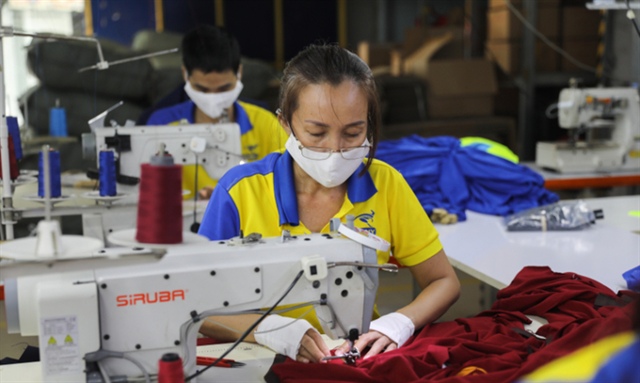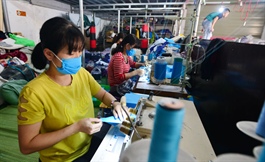Economic recovery depends on cash, labor support: experts
Economic recovery depends on cash, labor support: experts
Economists have urged the government to address the main obstacles of capital and labor shortages to reboot key sectors.
Workers at a garment factory in Ho Chi Minh City, October 2021. Photo by VnExpress/Quynh Tran |
With their resources depleted, businesses are in dire need of market, job and cash support, said Vo Tri Thanh, former head of the Central Institute for Economic Management (CIEM).
"The support program should be big and prolonged enough to rectify the unprecedented damage caused by Covid," he said, adding two years would be an ideal period for companies to catch up with the global recovery efforts.
Recovery would be reliant on investment and consumption stimulation, along with business reform, he added.
Vietnam’s Purchasing Managers’ Index (PMI) rose up to 52.1 points in October after a four-month decline, showing rising demand in material purchases for manufacturing as the economy resumes.
But companies are struggling with post-outbreak issues in capital and labor.
Although Hanoi-based garment maker Vinatex saw its nine-month profit exceed the entire year’s target by 20 percent, its chairman Le Tien Truong said many challenges remain, including recruiting staff and reconnecting with customers following a three-month suspension.
The company is also facing short-term financial pressure, he added.
Experts say even though incentive interest rates have been offered since last year, businesses are still having trouble accessing loans as banks remain unwilling to finance companies facing difficulties.
To ensure businesses receive the much-needed cash, the government could consider borrowing from the State Bank of Vietnam to issue bonds and use the money raised to support businesses, Nguyen Quoc Hung, general secretary of Vietnam Banks Association, told a forum last week.
Thanh said support should be aimed at sectors heavily hit by the pandemic and those that make big contributions to the economy like the garment, footwear and wooden furniture industries.
Nguyen Dinh Cung, a former head of CIEM, said developing infrastructure for both the traditional and digital economy is necessary, with public investment to help stimulate growth and create jobs.
With millions of workers leaving major localities for their hometowns in the third quarter and early October, some companies are struggling to source workers.
Nguyen Chanh Phuong, deputy standing chairman of the Handicraft and Wood Industry Association of Ho Chi Minh City (HAWA), said furniture companies are pushing manufacturing but do not have enough workers to fulfill rising orders.
Thanh said in the long run, there should be better policies to help employees feel secure at work, including social housing support.
With retail and service sales in July, August and September all plunging double-digit year-on-year, some experts have proposed stimulating demand to free up inventories.























